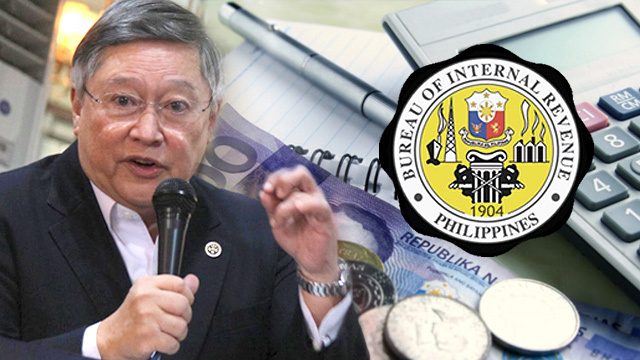SUMMARY
This is AI generated summarization, which may have errors. For context, always refer to the full article.

MANILA, Philippines – President Rodrigo Duterte has long promised to aggressively lower personal and corporate income tax rates, even threatening higher fuel excise taxes and removing exemptions from value-added tax (VAT) to help achieve the goal. This just got support from 19 former heads and deputy chiefs of the Department of Finance (DOF) and the National Economic and Development Authority (NEDA).
In a statement on Monday, January 9, 12 former DOF and NEDA secretaries and 7 finance undersecretaries have given their full support to the Duterte administration’s comprehensive tax reform program, which, they said, would “correct the structural weaknesses” of the country’s system and serve as a tool to decisively attack poverty and achieve inclusive growth.
This was after members of the House Makabayan bloc branded as “anti-poor” the first package of tax reforms submitted to the 17th Congress, which revealed proposed reduction in income tax rates, removal of VAT exemptions, higher fuel excise taxes, and a levy on sweetened products. (READ: DOF tax reform proposal ‘anti-poor’ – lawmakers)
“We, the former secretaries and undersecretaries of the DOF and the NEDA fully support the DOF’s comprehensive tax reform program as a long needed corrective to our tax system’s structural weaknesses and as a tool to achieve inclusive growth and transformative poverty reduction in our country,” the erstwhile senior government executives said in their joint statement.
Long needed corrective
The statement was signed by former DOF secretaries Cesar Virata, Jose Isidro Camacho, Jesus Estanislao, Roberto De Ocampo, Jose Pardo, Cesar Purisima, and Juanita Amatong; and former NEDA directors-general Arsenio Balisacan, Emmanuel Esguerra, Cielito Habito, Felipe Medalla, and Romulo Neri.
It was also signed by ex-DOF undersecretaries Joel Bañares, Romeo Bernardo, Cornelio Gison, Lily Gruba, Milwida Guevara, Jose Emmanuel Reverente, and Florencia Tarriela.
They said that, “the DOF’s proposed comprehensive tax reform is progressive, timely, and well-crafted to achieve the vision of a prosperous Philippines free of poverty. For these reasons we strongly support the reform and urge the public to do the same.”
Under the first package of the tax reform plan, the maximum rate of personal income tax will be reduced over time to 25% from the current 32%, except for the highest income earners.
The DOF estimated the overall loss of government revenue due to the proposed tax reforms would reach P173.8 billion, but said it would be offset by potential gains from revenue-enhancing reform.
These include an estimated gain of almost P200 billion from raising fuel excise tax, P164.4 billion from broadening the tax base through VAT-based expansion, around P18 billion for an excise tax to be applied to sweets, and P33.8 billion from rationalizing fiscal incentives.
The finance department said these estimates can still change.
“The Philippine government aims to triple real per capita incomes and eradicate hunger and poverty by 2040, if not sooner,” the former DOF, NEDA executives said. “We fully endorse the DOF’s tax reform as part of the solution toward achieving these aims.”
For them, the Duterte administration should carry out the proposed tax plan right away so it could sufficiently bankroll its inclusive growth and 2040 agenda.
They added that DOF’s proposed tax reforms are needed to correct the domestic tax system’s weaknesses that “make our economy less competitive relative to our neighbors and deprive our people of deeply needed investments to improve their lives.
In their manifesto, the former DOF and NEDA officials said the DOF’s tax reform package 1 “seeks to equitably raise around 1% of gross domestic product in additional revenues to fund the Duterte administration’s 10-point agenda.”
“We support the increase in oil and automobile excise taxes as a very progressive means of raising revenues and addressing the negative externalities of pollution and traffic congestion as families optimize the purchase and use of cars,” they said. (READ: SONA 2016: Duterte vows to cut income, corporate taxes)
Given that the top 10% of households or the richest 2 million households account for about 50% of all petroleum consumption, “raising oil excises means that we stop subsidizing the consumption of the rich and instead use the incremental tax revenues to fund infrastructure and protect the poor,” the former NEDA and DOF officials said.
In this regard, they said, “we also support the plan to provide highly targeted transfers to the poor and vulnerable to mitigate the impact of higher oil, food, and transportation prices.”
“This is consistent with the international best practice of limiting exemptions to the necessities of life,” they said.
An International Monetary Fund (IMF) team has given its nod to these proposed tax reforms for being “net revenue positive with due attention paid to equity.”
In a country assessment report released in September 2016, a staff team for the IMF Executive Board said they support “the authorities’ push for a comprehensive tax policy reform that is net revenue positive with due attention paid to equity.” – Rappler.com
Add a comment
How does this make you feel?
There are no comments yet. Add your comment to start the conversation.